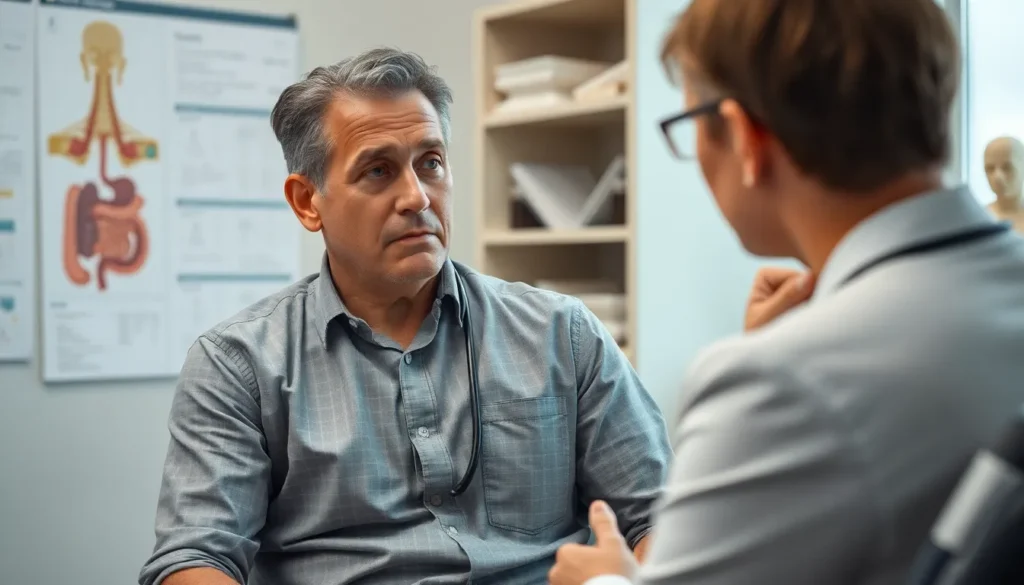Table of Contents
ToggleHemorrhoids can be an uncomfortable and often embarrassing issue for many people. When faced with this condition, knowing which doctor to consult is crucial for effective treatment and relief. Patients often wonder if they should see a general practitioner, a gastroenterologist, or a specialist in colorectal surgery.
Understanding the roles of these medical professionals can help streamline the journey to recovery. General practitioners can provide initial assessments and recommend treatment options, while gastroenterologists focus on digestive health. For more severe cases, a colorectal surgeon may be necessary to address complex issues. Knowing the right path can make all the difference in finding relief from hemorrhoids.
Understanding Hemorrhoids
Hemorrhoids, swollen veins in the rectal area, cause discomfort and distress. They can be classified into two main types, each presenting distinct symptoms.
Types of Hemorrhoids
- Internal Hemorrhoids: Internal hemorrhoids occur inside the rectum and often remain painless. They may cause bleeding during bowel movements, which may go unnoticed by the patient.
- External Hemorrhoids: External hemorrhoids form under the skin around the anus. They can be painful and may cause swelling and discomfort. Symptoms often include itching, irritation, and visible lumps.
Symptoms and Diagnosis
Symptoms of hemorrhoids vary based on type. Common symptoms include:
- Bleeding: Bright red blood after bowel movements indicates possible internal hemorrhoids.
- Pain: Pain during bowel movements or sitting points to external hemorrhoids.
- Itching: Persistent itching around the anus suggests irritation related to external hemorrhoids.
Diagnosis typically involves a medical examination. Doctors often perform a physical exam and may use procedures like anoscopy or sigmoidoscopy for further assessment. These methods enable direct visualization of the affected area, ensuring accurate diagnosis and appropriate treatment.
Specialists for Hemorrhoids

Consulting the right medical professional for hemorrhoid treatment is crucial. Different specialists play distinct roles in the diagnosis and management of this condition.
Primary Care Physicians
Primary care physicians often serve as the first point of contact for patients experiencing hemorrhoid symptoms. They conduct initial evaluations, offer advice on lifestyle changes, and prescribe medications to alleviate discomfort. If necessary, they refer patients to specialists for further assessment and treatment.
Gastroenterologists
Gastroenterologists specialize in the digestive system. They diagnose and treat hemorrhoids using methods such as colonoscopy. These specialists can identify underlying digestive issues contributing to hemorrhoid development, making them essential for comprehensive care.
Proctologists
Proctologists focus specifically on the rectal area and anal disorders. They provide advanced evaluation and treatment options for hemorrhoids, including non-surgical techniques. Proctologists are equipped to handle complex cases, offering expertise in procedures like rubber band ligation and sclerotherapy.
Colorectal Surgeons
Colorectal surgeons address severe or persistent hemorrhoids that require surgical intervention. They perform procedures such as hemorrhoidectomy to remove problematic tissue. These surgeons bring advanced skills and knowledge, ensuring effective management of complicated cases that do not respond to conservative treatments.
How to Choose the Right Doctor
Selecting the right doctor for hemorrhoid treatment involves assessing symptoms and understanding insurance requirements. These steps ensure effective care and avoid unnecessary delays.
Consider Your Symptoms
Assessing symptoms plays a crucial role in choosing a doctor. Determining the severity and type of symptoms helps identify the appropriate specialist. For minor symptoms, such as occasional itching or mild discomfort, a general practitioner may suffice. If bleeding occurs frequently or intensifies, a visit to a gastroenterologist or proctologist becomes necessary. Patients experiencing severe pain or complications may require a consultation with a colorectal surgeon. By evaluating symptoms accurately, patients can streamline their path toward effective treatment.
Insurance and Referrals
Understanding insurance coverage and referral requirements streamlines the selection process. Many insurance plans require referrals for specialist visits, which usually starts with a consultation from a primary care physician. Confirming plans and checking whether selected specialists are in-network can prevent unexpected charges. Researching available specialists within the plan’s network ensures access to qualified professionals for hemorrhoid treatment. By prioritizing insurance and referral considerations, patients secure timely and cost-effective care.
What to Expect During Your Visit
Patients should prepare for a focused discussion regarding their symptoms and medical history during their visit. It’s important to feel comfortable, as these consultations play a crucial role in obtaining effective treatment for hemorrhoids.
Initial Consultation
During the initial consultation, the doctor will ask specific questions about symptoms, including the nature, duration, and severity of discomfort. Patients may describe issues like bleeding, pain, or itching. The physician may perform a physical examination to assess any visible signs of hemorrhoids. Based on initial findings, the doctor will recommend appropriate next steps, which might include lifestyle modifications or referrals to specialists for further evaluation.
Diagnostic Procedures
Diagnostic procedures may follow the consultation, depending on individual circumstances. Common techniques include:
- Anoscopy: This procedure uses a small, lighted tube to inspect the anal canal and lower rectum directly. It allows for visualization of internal hemorrhoids.
- Sigmoidoscopy: This technique examines the rectum and lower colon, helping identify issues beyond the anal area. It provides a more comprehensive view that can reveal underlying conditions.
- Colonoscopy: In cases of severe symptoms or suspicion of other gastrointestinal disorders, a colonoscopy may be performed. This procedure examines the entire colon and helps rule out serious conditions.
These diagnostic methods are typically quick and aid in forming an accurate diagnosis, ensuring targeted treatment for hemorrhoids.
Finding the right doctor for hemorrhoid treatment is essential for effective relief and management. By understanding the roles of general practitioners, gastroenterologists, proctologists, and colorectal surgeons, patients can make informed choices based on their symptoms.
Whether dealing with minor discomfort or severe cases, consulting the appropriate specialist can lead to accurate diagnosis and tailored treatment plans. Prioritizing open communication during medical visits ensures that patients receive the best care possible. With the right support, individuals can overcome the challenges posed by hemorrhoids and regain their comfort and well-being.




